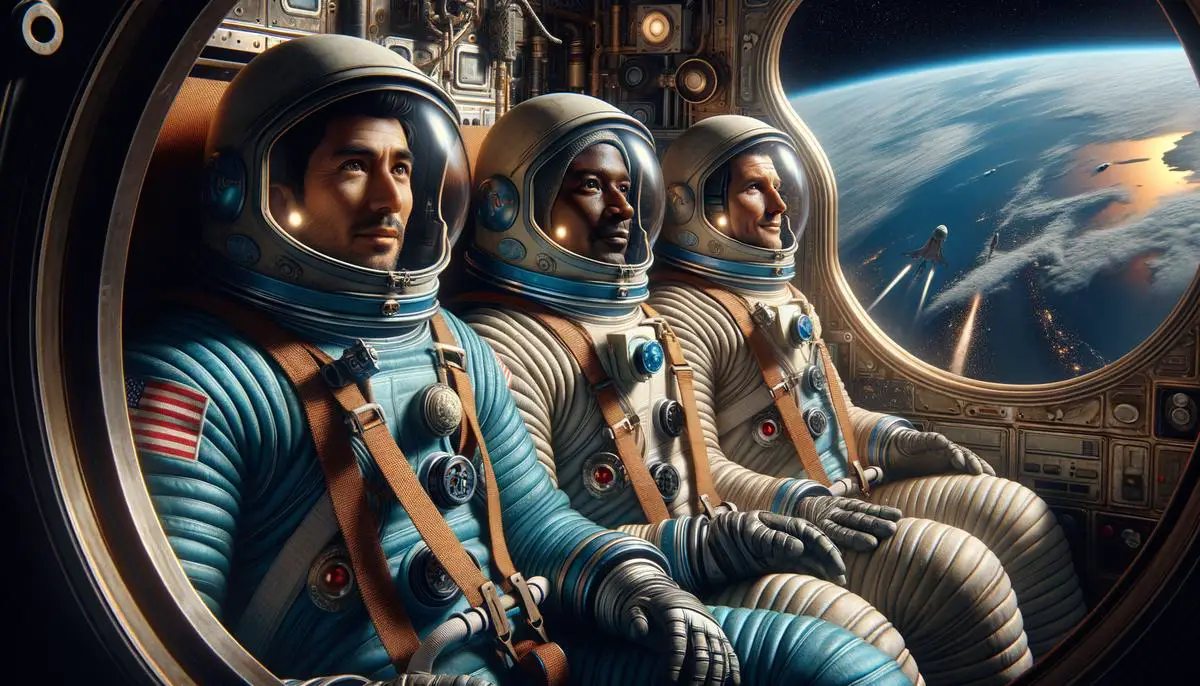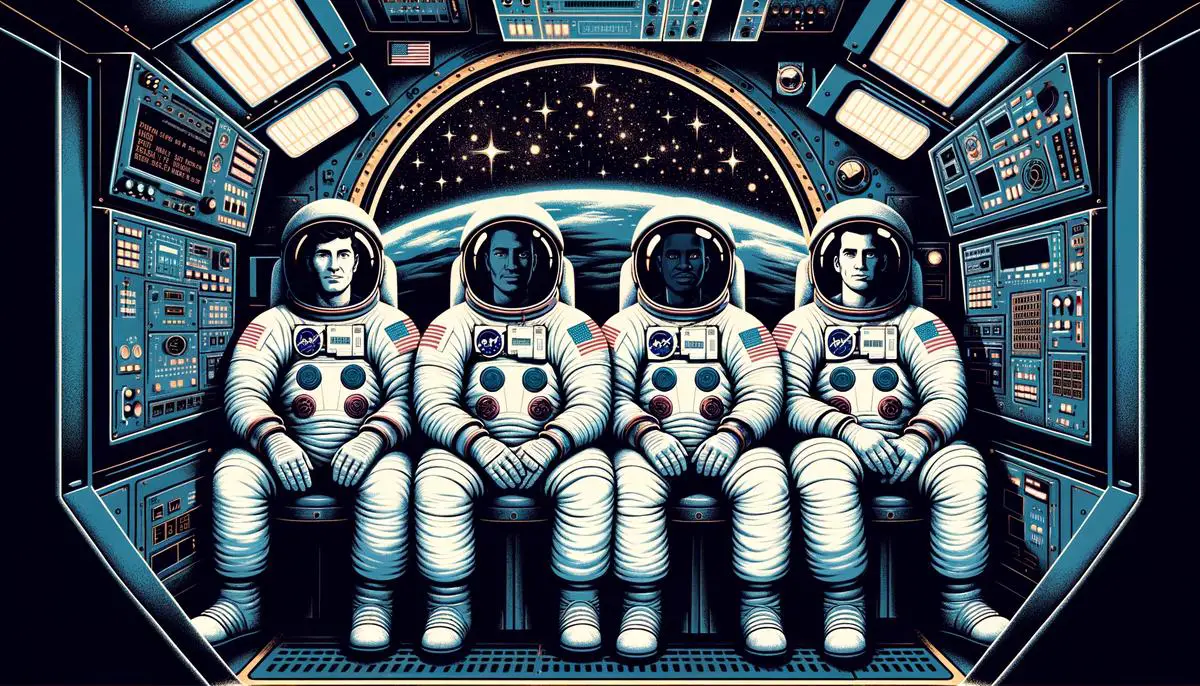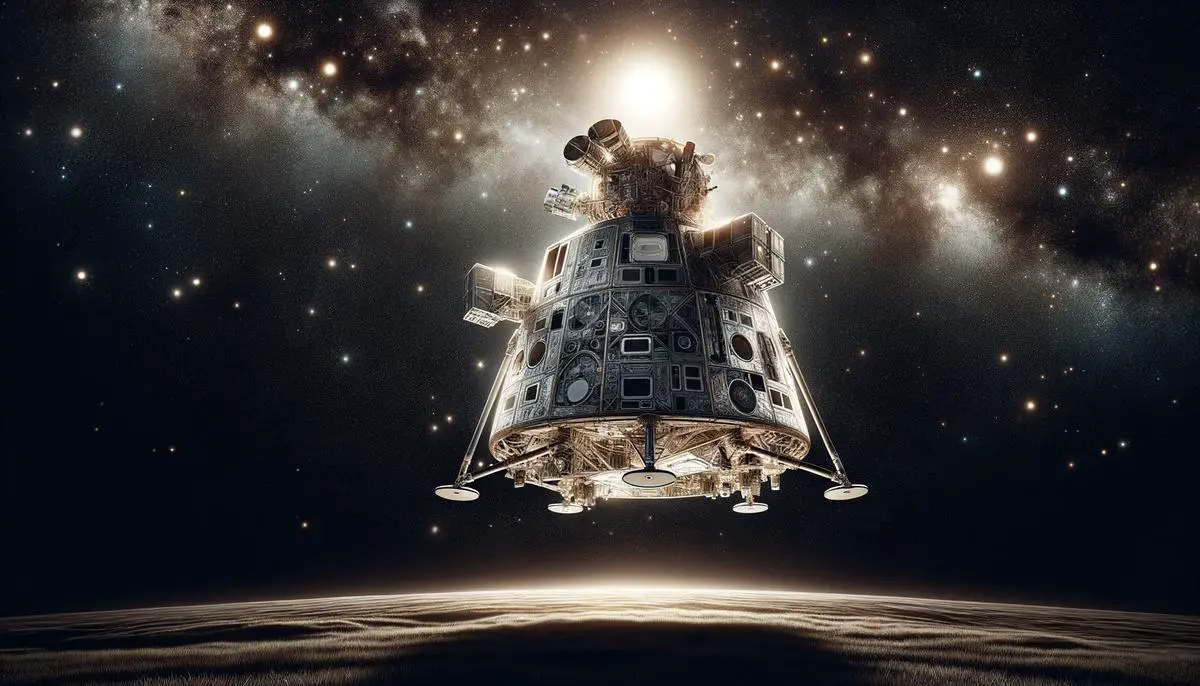Exploring space, humanity has often found itself facing immense challenges and opportunities for growth. A particular mission, Apollo 13, became not just a feat of technological skill but a symbol of human resilience and ingenuity. This narrative begins with an unforeseen crisis, transforming a routine space exploration into a dramatic battle for survival. The story that unfolds is one of collaboration, problem-solving, and the unwavering human spirit in the face of adversity.
Contents
The Impact of ‘Houston, We Have a Problem’
Apollo 13’s Journey Back to Earth: The Power of a Single Line
In the vast expanse of space, three astronauts aboard Apollo 13 were cast into a narrative as gripping as any that humanity has ever told. It was a saga not of lunar exploration, but of survival and ingenuity, encapsulated by a line that resonated around the world: “Houston, we’ve had a problem.” This utterance, simple yet loaded with the gravity of the situation, bridged the cold void of space, connecting the imperiled crew with the collective concern of humanity.
The Apollo 13 mission, intended to be NASA’s third moon landing, veered sharply from its script on April 13, 1970. An oxygen tank in the service module exploded, crippling the spacecraft. The stakes could not have been higher. James Lovell, John Swigert, and Fred Haise were over 200,000 miles from Earth, cocooned in a damaged vessel with dwindling resources.
Despite the dire context in which it was spoken, the phrase “Houston, we’ve had a problem” was a masterstroke of understatement. It was a call to arms that summoned the best minds at NASA to work feverishly against the clock. Ground control and the astronauts had to rewrite the mission’s ending from one of potential tragedy to one of triumphant return.
The resolution of the Apollo 13 ordeal was a testament to human resilience and technological ingenuity. In the face of this calamity, an international audience was spellbound, hanging on every development relayed from space and Mission Control in Houston. The world witnessed the power of collaborative problem-solving and the triumphs achievable when unified by a common goal.
Central to the drama was the Lunar Module ‘Aquarius,’ repurposed as a “lifeboat” to sustain the crew after the explosion. This critical decision, born out of necessity and quick thinking, showcased the adaptability required in moments of crisis. The astronauts, guided by the tireless support from Earth, managed their limited resources, rationed power, and navigated the perilous path back home through a precise sequence of maneuvers—a ballet of survival in the silent expanse of space.
Moreover, the ordeal of Apollo 13 emphasized the fragility of human ventures into space. It served as a sobering reminder that beyond our planet’s protective embrace lies an environment unforgiving of error. Yet, it also underscored the indomitable human spirit, our capacity to face near-insurmountable challenges with resolve and ingenuity.
Throughout this harrowing journey, the phrase “Houston, we’ve had a problem” remained a beacon. More than just words, it was a testament to the calm under pressure and the unbreakable bond between the astronauts and their lifeline on Earth. In its brevity, it carried the weight of the ordeal, the hopes for survival, and the relentless pursuit of solutions against the ticking clock of oxygen and power reserves.
From the moment these words were transmitted, they transcended their immediate context to become a symbol of overcoming adversity. They encapsulated the essence of the Apollo 13 story—a narrative not of reaching the moon but of the relentless human quest for exploration, survival, and the unwavering will to return home against all odds. Apollo 13’s journey back to Earth, marked by those words, remains one of the most compelling chapters in the annals of human exploration, a poignant reminder of our vulnerabilities and our strengths in the vast theater of space.

The Philosophical Weight of ‘Failure is Not an Option’
Within the tapestry of human achievement and our unquenchable thirst for knowledge, the phrase “Houston, we’ve had a problem” transcends the confinements of space exploration to echo the quintessence of human vulnerability and the instinctual drive toward collective problem-solving. This utterance, born of a moment precariously balanced between catastrophe and the unknown, serves not only as a testament to the Apollo 13 mission’s harrowing journey but as a beacon that illuminates the broader human condition.
In the shadow of the Apollo 13 mission, the phrase becomes a narrative vessel, carrying within it stories of countless endeavors where the margin between success and failure, life and death, is razor-thin. It finds resonance in situations far removed from the vacuum of space—everywhere human beings face adversities that require the confluence of hope, ingenuity, and cooperation to overcome. From medical teams battling to save a life on the operating table to communities rallying together in the aftermath of a disaster, the echo of “Houston, we’ve had a problem” is pervasive, reminding us that at the heart of every crisis lies the opportunity for unity and triumph.
This universality is rooted in the shared human experiences of vulnerability and adaptability. Just as the Apollo 13 crew and the ground control faced an unprecedented situation with calm and innovation, so too does humanity, time and again, confront its challenges by pulling together diverse talents and resources. The phrase encapsulates a moment of collective breath-holding—a universal understanding that despite the vastness of space or the magnitude of our problems, we are not insurmountable when we stand united.
Moreover, the phrase reverberates beyond the realm of crisis management, touching upon the essence of human persistence and the urge to explore. It reminds us that exploration, whether it be of outer space, the depths of the ocean, or the mysteries of our own planet, is fraught with perils. Yet, it is this very peril that cements our resolve to push forward, to explore not only new frontiers but the limits of our own endurance and creativity. “Houston, we’ve had a problem” thus becomes a clarion call, urging us not to retreat in the face of adversity but to confront it, learn from it, and emerge stronger.
The enduring impact of this phrase also lies in its ability to inspire. It speaks to the future generations of explorers, scientists, engineers, and everyday individuals facing their personal crises. It tells them that uncertainty is not an obstacle but a catalyst for innovation, that asking for help is not a sign of weakness but a step toward finding a solution, and that even in our darkest moments, there is light—a way back home, so to speak, guided by the collective spirit of perseverance and collaboration.
In conclusion, “Houston, we’ve had a problem” resonates beyond space exploration because it speaks to the core of the human experience—the inevitable encounter with adversity, the unyielding spirit of resilience, and the incomparable power of collective action. It is a reminder that while our problems may be vast as space, our ability to overcome them is equally boundless, forged in the crucible of cooperation and the indomitable human will to reach for the stars, no matter the odds.

The Emotional Echoes of ‘Okay, Joe’
In the vacuum of space, illuminated only by the distant sun and the Earth’s serene glow, a lesser-known exchange unfolded. It wasn’t merely a dialogue; it was a testament to the human condition, an intimate glimpse into the hearts and minds of those aboard Apollo 13. The world knows of the calamity that struck the spacecraft, a narrative dominated by technical malfunctions and a desperate race against time. Yet, beneath the surface of this well-told saga, there exists a moment profoundly human, shedding light on the astronauts’ unyielding resolve and reflective introspection.
As they maneuvered through the uncertainty, their spacecraft turned sanctuary, the astronauts engaged in a series of discussions that transcended the immediacy of their predicament. It wasn’t the mechanics of survival that defined these exchanges but rather the introspective journey they embarked upon, a journey into the essence of human vulnerability and resilience. In the quietude of space, they pondered not just on the technicalities of returning home but on the vastness surrounding them, the fragility of their existence against the cosmos’s enormity.
This dialogue, marked by its reflective quality, reveals much about the astronauts’ mindset. There’s a profound sense of interconnectedness, an awareness of being part of something much larger than themselves or the spacecraft they inhabited. It’s a realization that, despite the vast distances separating them from the rest of humanity, their story is a shared human experience, binding them to those who awaited their safe return.
In the stillness of space, where every word carries weight, the astronauts spoke of their hopes, not just for their safe return but for what their journey might signify for future generations. They discussed the importance of exploration, not as a conquest of the unknown but as a testament to human ingenuity and the relentless spirit of inquiry. Their words, infused with hope and a sense of duty, underline the essence of exploration as a catalyst for human growth and understanding.
Moreover, the astronauts’ exchange showcases the innate human capacity for adaptation and problem-solving. Faced with unprecedented challenges, their dialogue was punctuated by moments of technical ingenuity, yes, but also by an underlying theme of collective problem-solving. It’s a narrative that emphasizes not the individual but the collective, the power of unity in the face of adversity.
Through their discussions, the astronauts remind us that in times of crisis, it’s not only the immediate hurdles that test our resolve but also how we reflect on our circumstances. Their words, a blend of vulnerability and strength, highlight the significance of hope and cooperation. It’s a message that resonates beyond the confines of their spacecraft, touching on universal themes of human endurance and the power of collective will in overcoming the odds.
In essence, this lesser-known exchange among the astronauts of Apollo 13 serves as a profound narrative, shedding light on their inner lives amidst a crisis. It reveals the depth of their thoughts, their unwavering spirit, and the indelible mark of their journey on the collective human psyche. Through their reflections, they underscore the enduring message of Apollo 13: in the vastness of space, against the backdrop of unfathomable challenges, the human spirit prevails, anchored by hope, ingenuity, and shared resolve.

Narrative Reconstruction Through Quotes
Amidst the cold vastness of space, the story of Apollo 13 unfurls not just as a testament to human ingenuity and resilience but as an intricate tapestry woven with the threads of hope, adversity, and the unyielding human spirit. Each quote, each word uttered in the vacuum of space, echoes a profound lesson about our existence, transcending the mere technicalities of a mission gone awry.
The haunting refrain, “Houston, we’ve had a problem,” isn’t a simple declaration of distress; it’s a momentous unveiling of human vulnerability against the backdrop of the unknown. It conveys, with palpable tension, the fragility of life and technology when confronted with the unforgiving expanse of space. Yet, within this fragility lies the heart of Apollo 13’s narrative—a collective yearning to endure, to overcome.
As the astronauts aboard Apollo 13 navigated the perilous journey back to Earth, their introspective reflections in space unveiled a profound interconnectedness. These moments of vulnerability and contemplation allowed us to witness not just astronauts grappling with their mortality but humans facing the existential depths of isolation and camaraderie. Their perseverance serves as a poignant reminder of our innate drive to seek shelter in one another, especially when adrift in the vast emptiness.
The crisis of Apollo 13 became a forge for innovation and creativity. Faced with the imminent specter of failure, engineers and astronauts alike delved into the wellspring of human ingenuity, crafting solutions with the meager resources at their disposal. This crucible of adversity highlighted our collective capability to transcend limitations, turning uncertainty into a catalyst for transcendence and innovation.
In the face of encroaching doom, the unyielding unity and shared resolve of both the astronauts and the ground control team at NASA crystallized into a testament of what humanity can achieve together. This orchestration of collective effort in crisis management underscores not just the technical prowess, but the profound emotional and psychological strength inherent in our species. Such unity in purpose illustrates the depth of our collective problem-solving capacities when faced with the brink of annihilation.
Ultimately, Apollo 13 transcends the narrative of a failed mission; it becomes a beacon of hope, a reminder of the boundless potential of human collaboration and creativity. The quotes and conversations that emerged from this harrowing ordeal refract the broader spectrum of human emotions—fear, hope, despair, and relief—painting a vibrant portrait of the human condition.
The story of Apollo 13, echoed through its pivotal moments and memorable quotes, remains an enduring legacy that continues to inspire future generations. It serves as a celestial parable, illustrating that in the vast theatre of the cosmos, the human spirit, with its capacity for adaptation and resilience, shines the brightest. Through the lens of this extraordinary adventure, we learn that exploration—rooted in curiosity and fortified by courage—serves not only as a voyage outward into the unknown but as a journey inward, revealing the core of who we are as a species.
In this voyage of discovery, what emanates most profoundly is the transformative power of hope and cooperation in overcoming the insurmountable. The enduring message of Apollo 13 is a reflection of our indomitable will to explore, to survive, and to thrive amidst the adversities of the unknown.

The echo of Apollo 13’s experience resonates far beyond the confines of space exploration, touching upon the core of our existence. It’s a vivid reminder of our vulnerabilities, strengths, and the boundless potential that emerges when we come together to face the unknown. This chapter in human history stands as a powerful testament to the spirit of exploration and cooperation, compelling us to look forward with hope and determination. As we reflect on Apollo 13, we are reminded of the importance of unity and innovation, not only for the stars but for the challenges we face on Earth.
